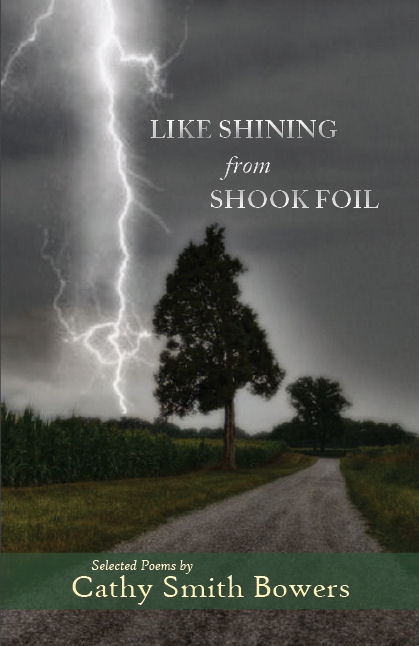
Like Shining from Shook Foil
Selected Poems by Cathy Smith Bowers
Press 53 Winston-Salem, North Carolina
142 pages
www.press53.com
When I was still a novice poet, an acquaintance introduced me to The Love That Ended Yesterday in Texas by Cathy Smith Bowers. Almost instantly I said to myself, “I want to write poems like these.”
More than a dozen years later, I feel the same way. Smith Bowers (what an apt name for a poet whose poems provide so much shelter for people who have known sorrow) writes in a voice that begs to be read aloud:
“Desert moved into town
and made itself at home.
Houses glowed like skulls.
Banisters lined the stoops
like rows of teeth.”
(“One Hundred and Ten Degrees”)
Readers of Like Shining from Shook Foil will not have to struggle with esoteric words or awkward syntax. Lines follow each other smoothly, most often by unfolding a clear narrative, but also by following a logic that, at least on the surface, seems predictable and trustworthy.
Stepping into one of Smith Bowers’ poems is like getting on a train. You’re off and running within the first few lines: “When I heard the sudden / thunder of my husband’s truck,” (“You can’t drive the Same Truck Twice”) or, “It’s not my brother’s dying / that I fear, that perfect healing” (“Pacific Time”). However, for all these elements that make her poems easy to get into and stay with, what is going on in them is by no means simple. One of my favorites of her early poems, “Wanting Them Back,” gets at the ambivalence many of us feel as we live between seasons by using the simile of a wood-carver who has fashioned a little boy out of a piece of pine. To the carver’s surprise, the boy comes to life and starts running away. Of the boy, Smith Bowers writes that he, too, is “astonished at the ruckus in his chest, / at the strange old man at his back / who kept crying Be wood! Be wood!”
Among her most compelling poems are those that deal with her relationships with her father, her brother, and her second husband, all now dead. These poems give voice to the anger, longing, bafflement, gratitude, and sadness that many of her readers know about firsthand, and many more will recognize as part of the human condition. None moves me more than “Learning How To Pray,” in which the writer, who has heretofore disavowed religion, becomes willing to pray to any god, goddess or substance, if it will help her brother:
I like a nymphomaniac
the dark promiscuity
of my spirit there
for the taking whore
of my breaking heart willing
to lie down with anything
As to the balance of the selections in the collection as a whole, there are generous portions from The Love That Ended Yesterday in Texas (Iris Books 1992) and Traveling in Time of Danger (Iris Books 1999). I wish the current editor, Tom Lombardo, had selected more poems from her Book of Minutes (Iris Books 2004), as I believe this brief form (an eight syllable first line followed by three four syllable lines, with this stanza pattern repeated three times) might well offer American poets our own distinctive short poem serving the same purpose as that of the Haiku. Although there are compelling poems from The Candle I Hold Up to See You (Iris Books 2009) such as “Questions for Pluto,” “Solace,” and “Pear Moonshine,” I am not sure that these poems convey the multi-layered complexity of her other collections. Happily, the section of uncollected published poems is loaded with wonders, most notably “River” and “Watching for Meteors.”
Like Shining from Shook Foil will bring new pleasures to all but the most inveterate readers of her poetry. For those not familiar with her work, this collection gathers the best of Smith Bowers’ poems, allowing readers a sense of their remarkable depth and breadth.
Like Shining From Shook Foil Selected Poems by Cathy Smith Bowers
Press 53
http://www.press53.com/bioCathySmithBowers.html
J. Stephen Rhodes‘ poems have appeared in Shenandoah, Tar River Poetry, and The International Poetry Review, among others. His poetry collection, The Time I Didn’t Know What to Do Next, was recently published by Wind Publications. He is a Presbyterian minister and a retired theological educator. His website is: http://www.jstephenrhodes.com
